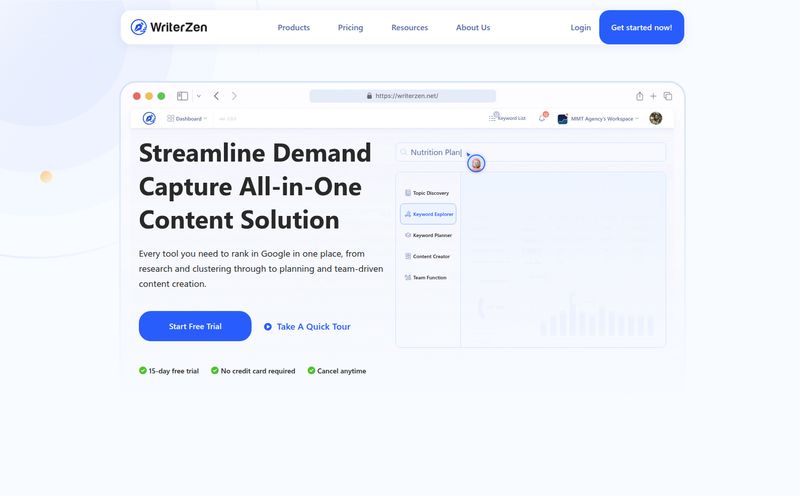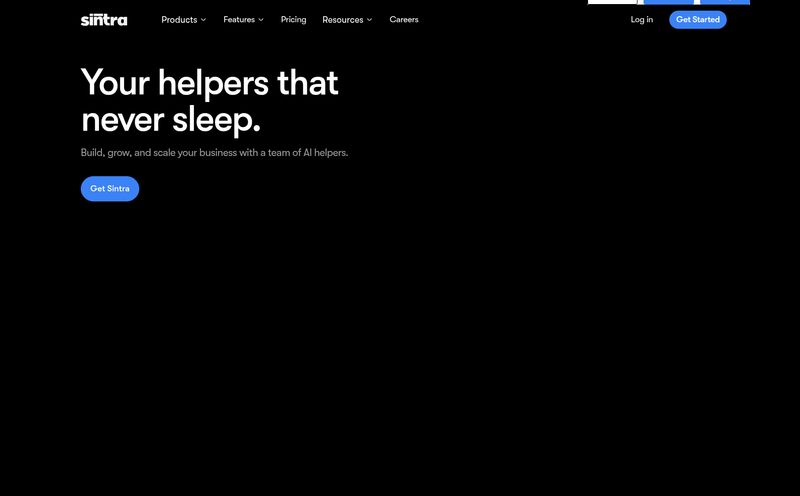I’ve been in the SEO and traffic game for a long, long time. I remember the days of painstakingly crafting product descriptions, stuffing them with just the right keywords (and sometimes, let’s be honest, the wrong ones), and then spending a small fortune on product photoshoots. You know the drill. Renting a studio, hiring a photographer, models, stylists... it all adds up. The whole process felt like pushing a giant boulder uphill. You’d finally get everything live, and then a new trend would hit, and your beautiful, expensive photos would suddenly look dated.
It was a grind. A necessary one, but a grind nonetheless.
So, when tools started popping up that promised to automate this with AI, my inner skeptic raised a well-trained eyebrow. Another magic bullet? Probably not. But then I started hearing whispers about a platform that wasn't just generating content, but was optimizing it for the next evolution of search. I’m talking about conversational AI search. The stuff Amazon is rolling out with RUFUS. That got my attention. That platform is Ecomtent, and I’ve got to say, it’s making me rethink a lot of things.
So What Is Ecomtent, Really?
On the surface, Ecomtent is an AI platform that creates content for your product listings. But that's like saying a Ferrari is just a car. It misses the whole point. Ecomtent is designed to help you win on the new battlefield of e-commerce: AI-powered search engines. It generates high-quality product images, infographics, A+ Content, and all the written copy to go with it. But the secret sauce is that it’s all created with platforms like Amazon RUFUS, Google’s Gemini, and ChatGPT Search in mind.
This isn’t just about making things look pretty. It’s about being discoverable in a world where customers ask their phones, "Find me a waterproof hiking boot that’s good for wide feet and has a classic look." The old rules of keyword matching are fading fast.
The Big Shift: SEO is Becoming GEO (Generative Engine Optimization)
For years, we've all been obsessed with SEO (Search Engine Optimization). We've chased Google's algorithm, building links, optimizing meta tags, and writing for crawlers. And now, Ecomtent is talking about Generative Engine Optimization (GEO). At first, I thought, oh great, another acronym. But the more I think about it, the more it makes sense.
GEO isn't about tricking a bot. It's about providing an AI with such rich, descriptive, and context-aware data about your product that it can confidently recommend it to a human. It's about feeding the machine the exact information it needs to understand not just what your product is, but who it's for and why it's the best choice for a specific, nuanced query. This is a fundamental change in how we need to approach product marketing. And frankly, most brands are not prepared for it.
Digging into the Ecomtent Features
So how does Ecomtent actually pull this off? It comes down to a few core capabilities that work together.
AI-Powered Visuals on Demand
This is the part that feels like actual magic. The cost and time associated with creating lifestyle imagery is a huge bottleneck for most businesses. Want to show your new backpack on a trail in the Swiss Alps? Or your coffee mug on a cozy, rainy windowsill in a London flat? Traditionally, that's a five-figure problem.
With Ecomtent, you upload a basic shot of your product, and it can place it in literally any scenario you can dream up, with different models, backgrounds, and moods. You can generate an entire library of diverse lifestyle images in an afternoon. It’s like having a Hollywood set designer and a global location scout on retainer, paid in clicks instead of cash.

Visit Ecomtent
Copywriting That Actually Understands Shoppers
The AI copy generation is equally impressive. It goes beyond just listing features. It can generate entire A+ Content modules, compelling bullet points, and product descriptions that speak to customer pain points. The key, again, is that it's being written for this new GEO world. The copy is structured to answer the kinds of questions people will ask conversational AI, making your product more likely to be surfaced as a solution.
The Secret Weapon: AI Search Analytics
For me, this is the killer feature. Ecomtent doesn't just help you create content; it gives you analytics on how your products are seen by AI search. It can show you how a tool like Amazon RUFUS answers questions about your product page and identify the gaps. This is like getting a copy of the exam questions before the test. You're not just guessing what content to create; you're making data-driven decisions to fill the exact informational voids the AI has. That’s a massive competitive edge.
Let's Be Real: The Potential Hiccups
Alright, it can't all be sunshine and roses. As an experienced practitioner, I have to look at the other side of the coin. There are a couple of things to be aware of.
First, Let's Talk About the Price
This is not a $20-a-month tool. Ecomtent is a professional-grade platform, and it has a price tag to match. It’s an investment. Let's look at the quarterly pricing to get a realistic idea:
| Plan Type | Starting Price (Quarterly) | Key Features |
|---|---|---|
| Seller / Vendor | $510 / month | AI Visibility Analytics, unlimited content for 25 SKUs/month. |
| Agency | $1360 / month | AI Visibility Analytics, content for 100 SKUs/month across unlimited accounts. |
| Retailer | $5100 / month | AI Visibility Analytics, unlimited content for up to 1000 SKUs/month. |
| Enterprise | Custom | Custom-built solutions for large businesses. |
When you first see those numbers, you might get a bit of sticker shock. But then, you have to weigh it against the alternative. What's the cost of one professional photoshoot? A good copywriter? The opportunity cost of moving too slow to react to a market trend? When you frame it as an investment in speed, scale, and future-proofing your business, the math starts to look a lot different.
The 'AI Oversight' Rule
The second point is crucial. You cannot just hit 'generate' and walk away. This is an incredibly powerful tool, but it's an assistant, not a replacement for your strategic brain. You still need a human to do a final review. Does the generated image perfectly match your brand's aesthetic? Is the tone of the copy exactly right? The AI gets you 95% of the way there in seconds, but that final 5% of human polish is what separates good from great. Don't get lazy.
My Final Verdict on Ecomtent
I've seen a lot of tools come and go. Most are just incremental improvements on what we already do. Ecomtent feels different. It feels like a response to a fundamental shift that is happening right now. The move from keyword-based search to conversational, AI-driven discovery is the biggest change to e-commerce in a decade, and Ecomtent is one of the first platforms I've seen that is built from the ground up to tackle it.
It’s not for everyone. If you have just one or two products and a shoestring budget, it might be overkill. But if you're a growing seller, a busy agency, or a large retailer trying to manage content at scale, I think it's not just a nice-to-have; it's rapidly becoming a need-to-have. The ability to generate unlimited, trend-responsive, GEO-optimized content is a powerful advantage. The old gold rush was about SEO. The new one is about GEO, and Ecomtent is selling some of the best pickaxes and shovels I’ve seen.
Frequently Asked Questions
What exactly is Generative Engine Optimization (GEO)?
GEO is the practice of optimizing your product content (both visual and text) to be easily understood and favored by generative AI search engines like Amazon RUFUS or Google's Gemini. It's less about specific keywords and more about providing rich, contextual information that allows the AI to confidently recommend your product for complex, conversational user queries.
Can Ecomtent completely replace my photographer and copywriter?
I'd say it can replace the need for a large portion of their routine work. It can eliminate the need for most standard lifestyle photoshoots and can produce excellent first drafts of copy. However, you still need a human eye for final brand approval, strategic direction, and that last touch of polish. Think of it as a massive force multiplier for your creative team, not a full replacement.
Is Ecomtent good for small businesses with only a few products?
It depends. The 'Seller / Vendor' plan is designed for smaller operations, but the cost might still be a barrier. If you're in a highly competitive niche and speed-to-market with new visuals is critical, it could be worth it. I'd recommend starting with their Free Audit to see the kind of insights they can offer before committing.
How does Ecomtent optimize for Amazon RUFUS specifically?
Ecomtent uses its AI Search Analytics to analyze how RUFUS currently interprets your product page and where the informational gaps are. It then helps you generate lifestyle images, infographics, and A+ Content that directly address the features, use-cases, and comparisons RUFUS needs to see to rank and recommend your product effectively.
Is the AI-generated content truly unique?
Yes. The content is generated on-demand based on your specific product and prompts. The visuals and copy are not pulled from a stock library. However, as with any AI, it's learning from vast datasets, so its 'creativity' is a sophisticated remix of what it has learned. It is still essential to perform a human review to ensure it aligns perfectly with your brand's unique voice.
Does Ecomtent offer a free trial?
While they don't offer a traditional free trial of the full content generation suite, they do offer a very valuable Free Audit. It analyzes your existing catalog and gives you metrics and insights on your optimization opportunities, which is a great, risk-free way to see the power of their analytics.
The Future is Now
Look, the way people find and buy products is changing under our feet. Sticking to the old playbook of static images and keyword-focused copy is a recipe for being left behind. Embracing the shift to a more dynamic, AI-first content strategy is no longer optional for those who want to lead the pack. Tools like Ecomtent are paving that new path, and for anyone serious about e-commerce growth, it's time to start walking it.



